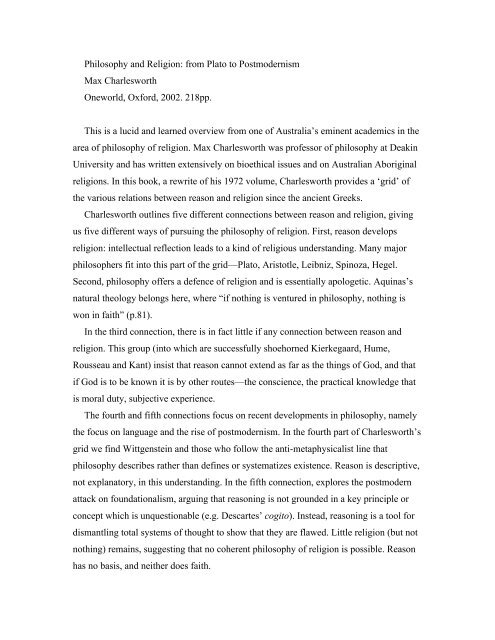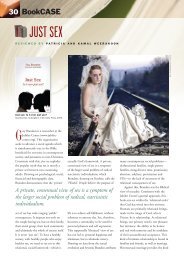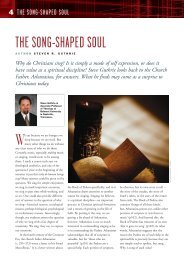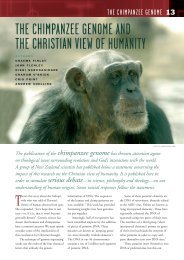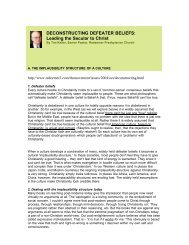Philosophy and Religion: from Plato to Postmodernism Max ... - CASE
Philosophy and Religion: from Plato to Postmodernism Max ... - CASE
Philosophy and Religion: from Plato to Postmodernism Max ... - CASE
- No tags were found...
Create successful ePaper yourself
Turn your PDF publications into a flip-book with our unique Google optimized e-Paper software.
<strong>Philosophy</strong> <strong>and</strong> <strong>Religion</strong>: <strong>from</strong> <strong>Pla<strong>to</strong></strong> <strong>to</strong> <strong>Postmodernism</strong><br />
<strong>Max</strong> Charlesworth<br />
Oneworld, Oxford, 2002. 218pp.<br />
This is a lucid <strong>and</strong> learned overview <strong>from</strong> one of Australia’s eminent academics in the<br />
area of philosophy of religion. <strong>Max</strong> Charlesworth was professor of philosophy at Deakin<br />
University <strong>and</strong> has written extensively on bioethical issues <strong>and</strong> on Australian Aboriginal<br />
religions. In this book, a rewrite of his 1972 volume, Charlesworth provides a ‘grid’ of<br />
the various relations between reason <strong>and</strong> religion since the ancient Greeks.<br />
Charlesworth outlines five different connections between reason <strong>and</strong> religion, giving<br />
us five different ways of pursuing the philosophy of religion. First, reason develops<br />
religion: intellectual reflection leads <strong>to</strong> a kind of religious underst<strong>and</strong>ing. Many major<br />
philosophers fit in<strong>to</strong> this part of the grid—<strong>Pla<strong>to</strong></strong>, Aris<strong>to</strong>tle, Leibniz, Spinoza, Hegel.<br />
Second, philosophy offers a defence of religion <strong>and</strong> is essentially apologetic. Aquinas’s<br />
natural theology belongs here, where “if nothing is ventured in philosophy, nothing is<br />
won in faith” (p.81).<br />
In the third connection, there is in fact little if any connection between reason <strong>and</strong><br />
religion. This group (in<strong>to</strong> which are successfully shoehorned Kierkegaard, Hume,<br />
Rousseau <strong>and</strong> Kant) insist that reason cannot extend as far as the things of God, <strong>and</strong> that<br />
if God is <strong>to</strong> be known it is by other routes—the conscience, the practical knowledge that<br />
is moral duty, subjective experience.<br />
The fourth <strong>and</strong> fifth connections focus on recent developments in philosophy, namely<br />
the focus on language <strong>and</strong> the rise of postmodernism. In the fourth part of Charlesworth’s<br />
grid we find Wittgenstein <strong>and</strong> those who follow the anti-metaphysicalist line that<br />
philosophy describes rather than defines or systematizes existence. Reason is descriptive,<br />
not explana<strong>to</strong>ry, in this underst<strong>and</strong>ing. In the fifth connection, explores the postmodern<br />
attack on foundationalism, arguing that reasoning is not grounded in a key principle or<br />
concept which is unquestionable (e.g. Descartes’ cogi<strong>to</strong>). Instead, reasoning is a <strong>to</strong>ol for<br />
dismantling <strong>to</strong>tal systems of thought <strong>to</strong> show that they are flawed. Little religion (but not<br />
nothing) remains, suggesting that no coherent philosophy of religion is possible. Reason<br />
has no basis, <strong>and</strong> neither does faith.
Each section of Charlesworth’s book is clearly written <strong>and</strong> thoughtfully argued,<br />
highlighting the strengths <strong>and</strong> weaknesses of the five kinds of connection between reason<br />
<strong>and</strong> religion. He does not opt for one over the other, claiming that the philosophical<br />
principles employed in each different part of the grid prevent comparison. I agree that<br />
this is true, <strong>and</strong> that other forms of knowledge need <strong>to</strong> be introduced <strong>to</strong> make an<br />
assessment. Perhaps the most valuable form is his<strong>to</strong>rical knowledge. The his<strong>to</strong>ry of<br />
religions can be brought in<strong>to</strong> interaction with the philosophy of religion, suggesting at<br />
various points either support or critique for the philosophical position. The specific<br />
his<strong>to</strong>rical claims of religions such as Christianity, Judaism or Islam, provide ‘test cases’.<br />
For example, one might ask whether any of the his<strong>to</strong>rical data for Christ’s existence, his<br />
impact on the first century world, <strong>and</strong> his death <strong>and</strong> resurrection, can be brought <strong>to</strong> bear<br />
on the philosophical questions. If it can, it would make fideism (the third part of<br />
Charlesworth’s grid) unsustainable, since something of God might be known through<br />
his<strong>to</strong>rical reasoning.<br />
But this is <strong>to</strong> move outside the scope of Charlesworth’s book, which remains an ideal<br />
high-level introduction <strong>to</strong> the philosophical nature of religion, <strong>and</strong> one which would<br />
make an excellent textbook.


